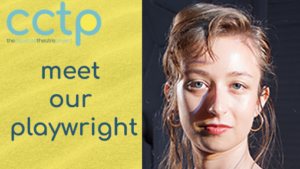Meet Our Playwright – Selina Fillinger
Where are you from? Where do you live?
I was raised in Oregon, and I currently live in L.A., but I do stints in New York, or wherever my work takes me.
How did you become a playwright?
I was writing stories as soon as I learned to spell, but it was always just something I did for myself; I never considered it a viable career because I didn’t know how to be inspired on command (it’s honestly still a mystery). I entered Northwestern as an actor and took Intro to Playwriting on a whim, feeling pretty confident because writing classes had always been a breeze for me. It turned out to be so challenging, and I was completely humbled. I felt like I was learning an entirely new way of seeing and hearing. It took me a few more years to identify as a playwright, but that class is where it began.
Is there a recurring theme in your plays that you write about?
Probably. But I choose to be willfully ignorant about what my “thing” is, mostly to avoid confronting what “isn’t my thing.” I never want to know what I can’t do, or don’t do, what’s out of character for me, because then I would have an artistic ceiling. If I do have a ceiling, I have to pretend I don’t, so that I can keep developing my voice. It may be the job of the critic or the scholar or the audience member to contextualize my work–maybe, I’m not sure, that’s a conversation about literary criticism for another time–but if it’s their job to corral me into a lane, it’s my job to wreak havoc with the traffic cones.
What led you to write this play?
Manhattan Theatre Club invited me to participate in their Sloan Initiative, which commissions plays about math, science, or technology. I am particularly interested in pollinator decline and loosely pitched a farce about Colony Collapse Disorder. But, as I dug into the research, I found so much poetic metaphor and poignancy in the way that pollinators take care of the earth and each other. At the time, I happened to pick up the book Gaia & God, which is, in part, about how our cultural avoidance of death, or our unwillingness to see decay as an opportunity for new life, prevents us from developing sustainable climate solutions. We fixate on consumption, growth, and material products so that we don’t have to confront our mortality; that fear of facing death in the short run is dooming us in the long run. But of course you can’t just write a doom-y climate play that’s going to shut everyone down with despair. So the question became, “How do I make this issue funny, sexy, sensual, tender?”
What are you most looking forward to in your week of development?
Being in Cape Cod! I’ve never been! And revisiting this play for the first time since the pandemic (the real-life Collapse). I’m sure things will hit very differently now.
What advice do you have for the participants in our college program who are interested in pursuing a life in the theater?
- Be kind and human to everyone you work with regardless of whether they’re unpaid interns or movie stars. I say this as a playwright who’s been mistaken for the intern.
- Don’t gossip, don’t publicly drag people’s work, and don’t complain about how little money you’re making when in mixed company; usually there is someone in the room who is working for free just to be in the space.
- Consume art that isn’t theatre.
- Volunteer in your community and build a life beyond your artistic pursuits.
- Don’t be afraid. People will tell you a life in the theatre is hard, unstable, unfeasible. It can be, but the truth is nothing in this world is easy or stable or certain. If this year has taught us anything it should be to hug the people we can and do what we love.
Anything else you would like our audience to know about the play before they see it?
Try to pretend you’re in a theatre! With real people filled with real blood! One day soon….


